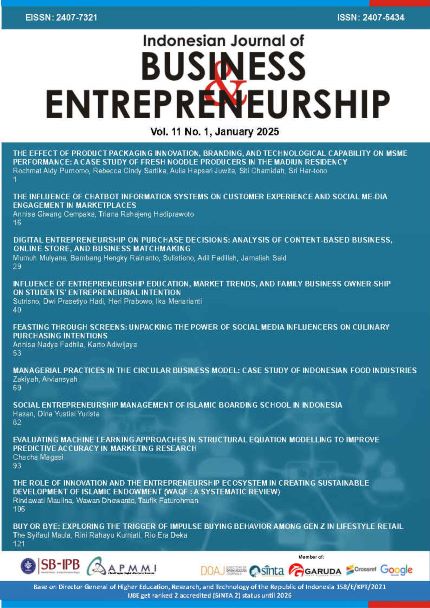Understanding Non-Wage Workers Behavior Towards BPJS Employment Programs: A Boundedly Rational Planned Behavior Analysis
Abstract
Background: The ongoing gap in social security protection for informal workers (BPU) presents a significant challenge for BPJS Employment, necessitating a deeper understanding of factors influencing participation in social security programs.
Purpose: This study aims to analyze the characteristics of BPU workers and their participation in BPJS Employment programs through an expanded Boundedly Rational Planned Behavior theory.
Design/methodology/approach: Conducted in Jakarta, the research employed a convenience sampling method with 130 respondents. Data analysis was performed using Smart PLS software.
Findings/Results: The study found that attitudes and subjective norms did not significantly influence rational planning, although some trends were observed. Similarly, perceived behavioral control had no significant effect on rational planning, consistent with previous research suggesting that perceptions of control are more relevant in less complex decision-making contexts. However, knowledge was identified as a significant predictor of rational planning, underscoring its crucial role in fostering engagement. While rational planning did not directly affect participation, positive attitudes were found to significantly influence participation levels. In contrast, subjective norms and perceived behavioral control did not significantly impact participation. Although perceived behavioral control showed a marginal effect on participation, this effect did not reach statistical significance, suggesting that individuals' perceptions of their ability to control participation outcomes may have a limited influence in this context. Knowledge was also a critical factor in encouraging participation, emphasizing the importance of awareness in promoting active involvement.
Conclusion: The findings highlight that the attitudes of informal workers significantly drive participation in the BPJS Employment program, while knowledge plays a crucial role in enhancing rational planning and engagement. Although subjective norms and perceived behavioral control have a minimal direct impact, the marginal effect of perceived behavioral control suggests that boosting individuals' confidence in managing their participation could enhance involvement. Overall, addressing knowledge gaps and fostering positive attitudes are essential for increasing participation rates among informal workers and providing insights for targeted interventions to promote social security protection for this vulnerable group.
Originality/value (State of the art): This research contributes to the understanding of participation dynamics in social security programs for informal workers, advocating for targeted educational campaigns to enhance knowledge, foster positive attitudes towards BPJS, and address barriers to participation.
Keywords: employment programs, informal workers, theory of planned behavior, BPJS








